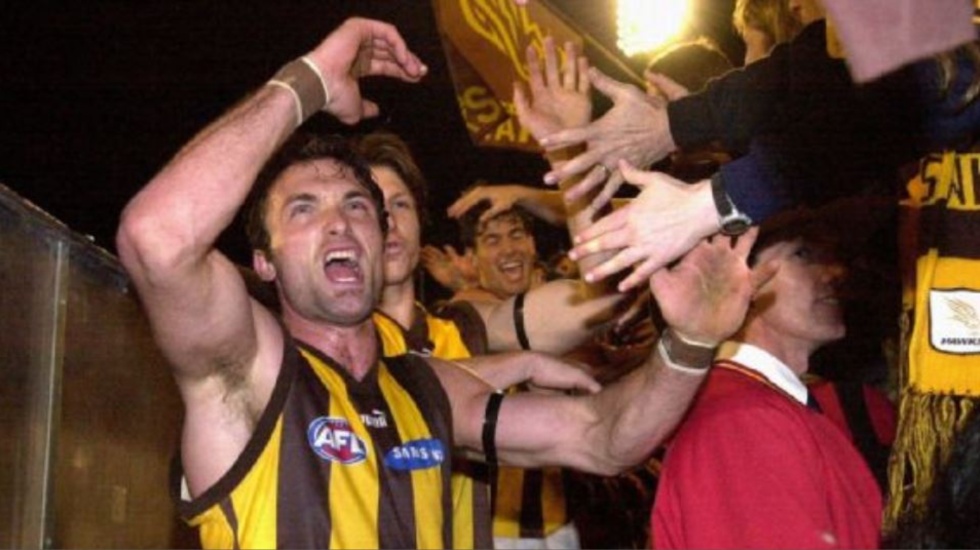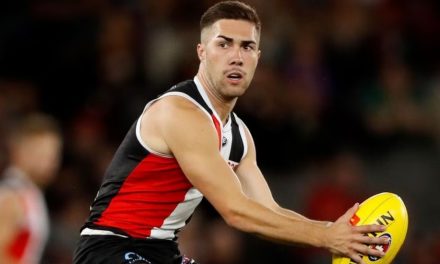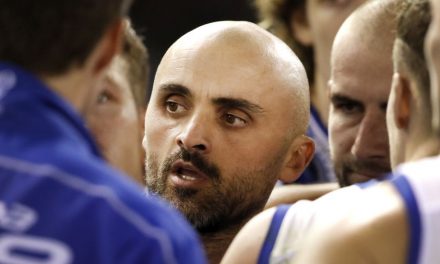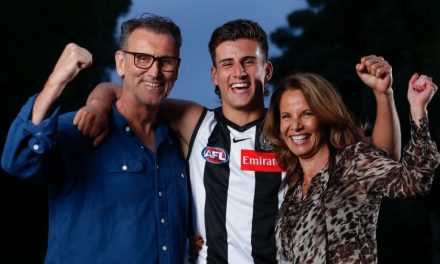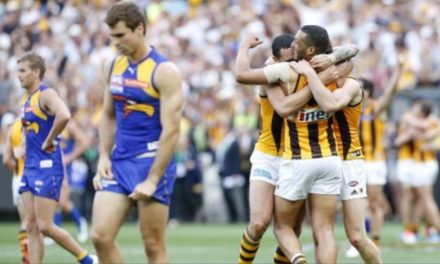Hawthorn’s Angelo Lekkas celebrates with fans after the semi-final win over Port Adelaide in 2001. Photo: TONY LEWIS
A young, exciting Hawthorn team is on a roll, having won its elimination final by plenty on the MCG. Now it heads to South Australia to take on a chastened Port Adelaide on its home turf.
Sound familiar? It certainly should to Hawk fans, and maybe even to plenty of neutrals, because this week’s scenario is a carbon copy of 2001, when Hawthorn beat Port Adelaide in a massive upset at Football Park.
In doing so, the Hawks became only the second Victorian team to win a final interstate in 15 attempts, ejecting the Power from the finals in straight sets after they’d finished the regular season in third sport, three wins ahead of the sixth-placed Hawks.
Port Adelaide had won its last six home and away games but been comfortably beaten by Brisbane in its qualifying final the previous week, while Hawthorn had made short work of Sydney by 55 points, giving Peter Scwhab’s team a real shot of confidence.
But the Hawks had their off-field challenges, too. This game was played just four days after the terrorist attacks on the World Trade Centre in New York. Ansett Airlines had also recently collapsed, events which conspired to require the Hawks to fly to Adelaide in a small postal plane from Essendon Airport rather than Tullamarine.
“It was a new experience for all of us,” former Hawk forward John Barker recalled on the club’s “Golden Years” podcast in 2020. “I remember sitting there in a long row, one side of the plane players and staff, the other side players and staff, and it honestly reminded me of the movies when you see those guys piling out of the army planes.”
Barker says Schwab played on the “military mission” sense. But it was the home team which started the battle better, with Jarrad Schofield kicking the first goal of the game and Stuart Dew and Chad Cornes adding two more, Daniel Chick Hawthorn’s sole goalkicker and Port leading by 12 points at the first break.
But that was an advantage reversed in the second term as the Hawks began to settle down. Three goals in a six-minute burst to Shane Crawford, Trent Croad and Kris Barlow gave Hawthorn a six-point lead, and only a goal to Port’s Josh Carr right on siren time got back the Power back within a point at half-time.
In a third quarter which for the majority was a stalemate, Hawthorn’s number appeared to finally be up when in a low-scoring game, Port Adelaide slammed on three goals in under four minutes, Power star Gavin Wanganeen booting the first and Che Cockatoo-Collins two more inside a minute, the gap 17 points at three-quarter time.
Hawthorn had kicked just five goals, and its key forward trio of Nathan Thompson, Nick Holland and John Barker had barely fired a shot.
That, though, changed with the first two goals of the final term kicked by Thompson, the first a long bomb from 50 metres, the second after marking unattended in the goal square. Suddenly, it was just four points the difference.
PLEASE HELP US CONTINUE TO THRIVE BY BECOMING AN OFFICIAL FOOTYOLOGY PATRON. JUST CLICK THIS LINK.
Port Adelaide answered soon enough through the unlikeliest of sources, full-back Darryl Wakelin, then blew a chance to effectively ice the game when Peter Burgoyne missed a gettable shot which would have put the Power three goals up.
And Hawthorn continued to chip away, Barker now threading one from hard up against the boundary line in the forward-pocket, a superb shot from what had seemed an impossible angle.
What made it an even better kick was that Barker had been concussed early in the game, and had been off the ground for two quarters nursing a migraine.
“I had some issues with being able to see and had some blurred vision that started after a knock in first quarter,” Barker recalls. “I spent some time down in the changerooms being sick … I only remember bits and pieces, like the old trainer Kenny Goddard holding me up in the shower when I was nauseous.”
Then, in a scene Hawk fans would be a lot happier with seven years later when he did it for them in a grand final, powerful Port forward Stuart Dew swung on to his left foot and dobbed one from inside 50. Almost instantly, though, the Hawks responded through a Daniel Harford snap after a clever tap from Richie Vandenberg.
With just on three minutes left, Port led by three points. Hawthorn’s Mark Graham wrenched the ball from a throw-in and found a somehow unattended Angelo Lekkas in the centre of the ground. Lekkas found Barker on a lead, 45 metres out on the opposite flank to his previous shot. And again, the ice-cool forward hit the mark. Hawthorn hit the front with two minutes 26 seconds left on the clock.
And there they would stay. Port had one last golden chance after winning a turnover in Hawthorn’s forward line and having the numbers forward. Fabian Franics belted the ball forward, but the Hawks’ Graham brilliantly outmarked Cockatoo-Collins in a contest to repel the danger.
And as the Power’s Warren Tredrea launched one last desperate bid to score, the siren rang, the despair of the rabid home fans matched by the rapture of the small but vocal band of Hawk fans who’d made the trip by whatever means possible into enemy territory.
Port Adelade was shattered, out of a finals series, not for the last time, in straight sets. Hawthorn would go on to a preliminary final again a massive outsider against the seasoned Essendon, the Bombers emerging victorious by only nine points after being given a hell of a fright.
Hawthorn in 2001 was a team that played with dare and with a sense of having nothing to lose. Nearly a quarter-of-a-century later, as the Hawks again prepare to take on a Port Adelaide side in danger of departing a finals campaign without having fired a shot, the vibes are eerily similar.
This article first appeared at ESPN.

